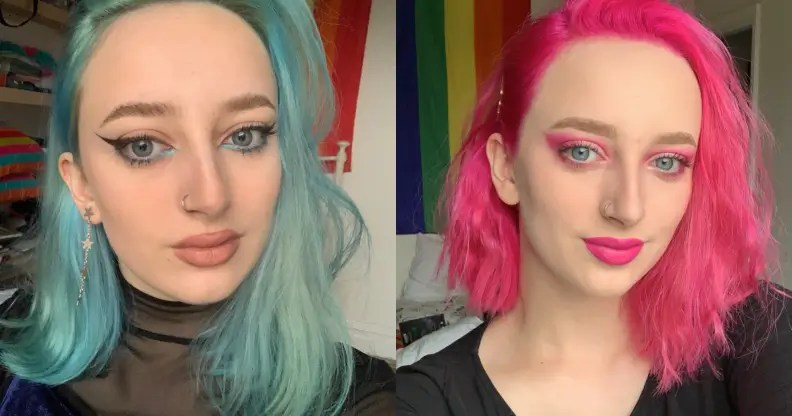We are failing young people by not trusting them to be the experts about their own lives

Simone Penn. (Supplied)
Simone Penn. (Supplied)
Simone Penn is an ambassador for Just Like Us, the LGBT+ young people’s charity, who lives with fibromyalgia, a long-term condition that causes pain all over the body.
For Disability Pride Month, she has told PinkNews about how, growing up, her pain was ignored by adults who thought they knew better than her.
“I started to realise I was a lesbian at the same time the pain began to set in. I was 14 and it felt as if I had woken up very far from the path I had been walking all my life, towards the same future as my friends and peers.
I felt scared and alone, so I did what we teach all young people to do when they feel afraid: I told an adult.
I had no idea of who to talk to about my sexual orientation but I knew exactly who I was supposed to speak to about my health, so I went to my family GP.
Thus began four years of exhausting, humiliating limbo. I knew that something fundamental had changed within my body – every nerve hurt, climbing the stairs could reduce me to tears, and I woke up every morning more tired than the night before.
But the doctors were clear: there was nothing seriously wrong with me. I should take ibuprofen and try to get more sleep – it wouldn’t even be worth an x-ray until I was 18.
My grades suffered but I had no doctor’s note to prove that I was in pain, and, therefore, I must have been making excuses. I felt I was living in a parallel reality, where the adults who were supposed to look after me were suddenly denying the defining reality of my daily life.
I felt as if I was screaming into the abyss, and the experience made me feel bitter, angry and very alone.
I didn’t come out to any of the adults in my life for two years because I no longer trusted that they would listen and because I couldn’t bear to put myself in a vulnerable situation only to be told once more that I couldn’t possibly know what I was talking about.
I now understood that they did not believe I was the primary authority on my body and mind because of my youth and perhaps also because of my gender.
‘When I talk to young people, particularly trans young people, I hear a version of my story reflected back at me’
I’m an ambassador for Just Like Us, and visiting schools reminds me every day how smart, complicated and thoughtful young people are.
From 11 years old all the way up to 18, the young people we meet are having conversations about identity and society that most politicians would find confusing. But our culture around young people relies on Victorian ideals about their capability to think complex thoughts, and that means that we fail thousands of young people every day – by presuming they need adults to tell them how to think and feel.
This isn’t an LGBTQ+ issue, or a disability issue. Teaching young people that they can’t trust adults to listen affects a range of social issues, from abuse to neurodivergence, and means that young people stop confiding in the adults who should be able to look after them. For the rare adults who are prepared to listen, it means that they might never get that chance.
When I talk to young people, particularly trans young people, I hear a version of my story reflected back at me. Theirs is the experience of knowing something in your bones and having that truth invalidated every day, in every way possible.
We expect teenagers to sit quietly and let the adults around them influence all their decisions, from what to study, to whether or not they deserve life-saving care. Then, when they turn 18, we expect them to be ready to make all the right decisions on their own.
When I finally started receiving treatment, the physiotherapist told me that four years without care meant that the muscles around my joints had atrophied. As metaphors go, it’s a little on-the-nose, but it’s a good example – if I had been listened to like an adult, like the only authority on what was happening in my mind and body, then I’d have been prepared to start living my own life at 18. Instead, I was struggling to do basic tasks.
What would the world look like if we moved past these Victorian ideals about young people and started to see them for what they are?
To begin with, I think we’d have to change a lot about society, from parenting, to education and politics.
But, in my time as an ambassador, I’ve met some wonderful teachers who dedicate themselves to listening to the kids around them, and their classes are joyful spaces where the children ask thoughtful, respectful questions and listen to one another.
Soon, the government will release guidance that will reportedly force teachers to inform parents if a young person tries to tell them that they are questioning their gender. Soon, even those rare adults whose students trust them to listen may lose that trust, and those spaces will lose some of their magic.
If we want to protect young people, and if we want them to become adults who feel confident using their voices, we have to start teaching them that we can be trusted to listen.”

